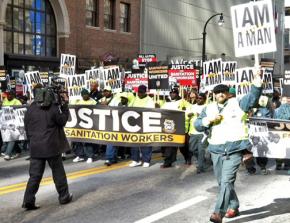“I am still a man”
reports on a union recognition struggle by sanitation workers in Atlanta.
ON JANUARY 21, thousands of people marched through the streets of Atlanta as part of the city's annual Martin Luther King Jr. Day parade. One of the largest contingents in the march this year was a group of around 200 DeKalb County sanitation workers, their family members and supporters.
The workers, organized through Teamsters Local 728, are engaged in a struggle to pressure DeKalb County, one of the larger counties in Metro Atlanta, to grant them union recognition.
The memory of the famous 1968 sanitation strike in Memphis that Dr. King was supporting when he was assassinated was ever-present during the march. Clad in their bright-green work vests, DeKalb sanitation workers held picket signs proclaiming, "I Am Still a Man"--a reference to the slogan used by Memphis strikers 45 years ago.
The march was attended by two retired sanitation workers from Memphis who took part in the 1968 strike. During their speeches at a rally that followed the march, the two men, Alvin Turner and Baxter Leach, drew connections between their experience and the current struggle in DeKalb County.

"It seems like, today, we have the same fight again," explained Turner. "We don't have Dr. King now: that means we're going to have to do this job ourselves--each one of us...It's bad for us to have to fight another fight that we've already won. And they're doing the same thing to you now that they did to us in '68."
The DeKalb sanitation workers' organizing drive began some four months ago, when a group of roughly 40 workers attended a meeting between county officials and school bus drivers. The sanitation workers, who had assumed the meeting was open to all county employees, hoped to discuss some of their ongoing grievances with county officials. They were, however, quickly informed that the meeting was just for school employees. But one of the bus drivers in attendance put the sanitation workers in contact with organizers from Teamsters Local 728.
From that point forward, the Teamsters began sponsoring a union organizing drive. Currently, around 85 percent of the 150 workers in the sanitation department have signed union cards. In the coming months, the workers hope to force county commissioners to vote to grant union recognition and give them automatic dues check-off.
The sanitation workers were initially driven to start their organizing drive, in part, as a response to ongoing efforts by the county to squeeze workers in order to make up for budget shortfalls. The county has done this through increasing workloads and neglecting equipment maintenance. Meanwhile, it hasn't granted the workers a raise in more than four years.
As sanitation worker Angelo Williams explained, "The main thing is, we don't have enough man power to do the job. We've been running one-man trucks all summer long. They've been killing us all through the summer heat. A lot of these guys are just worn out now. And our equipment breaks down almost daily; we need better-maintained equipment."
IN ADDITION to these specific issues, the workers were also driven to organize by something less tangible: they want respect. Much like the Memphis sanitation workers before them, the DeKalb County workers--who are overwhelmingly Black--have become frustrated by the lack of acknowledgement and respect accorded to them.
"People put their trash out in the morning, they come home and it's gone, and they don't think about it," Williams explained. "They don't know what it takes to actually pick that trash up. Some people say they see us driving around, not doing anything. But in the meantime their trash is picked up, their yard waste is picked up, their recycling is picked up. What we do, people see the results of everyday."
The struggle for union recognition by DeKalb sanitation workers comes amidst a broader effort by sanitation workers and labor unions to organize in a number of cities throughout the South. This month, a protracted campaign in Charlotte, N.C., by city workers--most prominent among them, workers in the city's sanitation department, organized through United Electrical Workers Local 150--finally succeeded in pressuring the City Council to allow them to sign up for automatic dues check-off with their unions.
For months, Charlotte sanitation workers held rallies and speak-outs at City Council meetings, drawing support from trade unionists throughout the region, as well as members of Occupy Charlotte and other local activists. Notably, the Charlotte workers continued their protests and mobilizations through the Democrat's 2012 National Convention, held in Charlotte.
In March of last year, sanitation workers in Mobile, Ala.--organized through Teamsters Local 991--waged a successful strike against Republic Services, preventing the company from backtracking on a contract agreement to waive two separate health care fees for workers. The strike victory was made possible, in large part, by a series of solidarity strikes waged by other Republic-employed Teamsters in Buffalo, N.Y., Columbus, Ohio, and Seattle.


